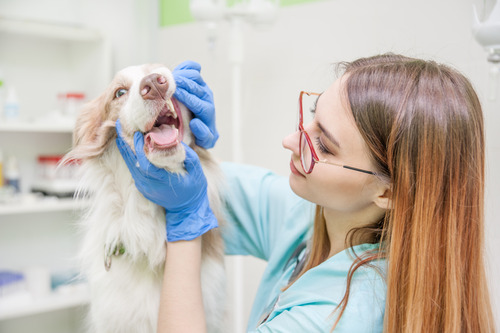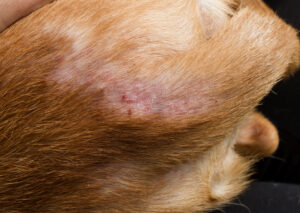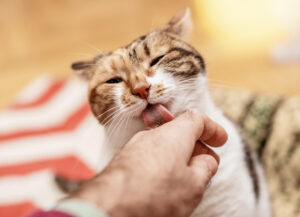Good dental health is an essential part of your dog’s longevity and quality of life. In short, it’s needed to keep them healthy. If their mouth isn’t healthy, then your dog may have other issues related to that problem. Dental disease is a common problem in dogs that often results in chronic mouth pain, tooth loss, and even major organ disease. Here, we’ll explore dental disease in dogs, focusing on its treatment and ways to maintain healthy teeth and gums. Arvada Veterinary Hospital in Arvada, Colorado, is here to help for expert dental care. Feel free to contact us at (303) 424-4439.
What is Dental Disease in Dogs?
Periodontal disease affects the tissues surrounding the teeth. It starts with plaque formation, consisting of food remnants, saliva, and bacteria. If not removed, the plaque hardens into tartar, which can cause gum inflammation or gingivitis. Without intervention, this condition will worsen, impacting deeper tooth structures and potentially causing other significant oral health problems in your pet.
What are the Stages of Dental Disease?
Dental disease has stages. If your dog’s condition is caught at the earliest stage, its effects may be reversible. In later stages, the effects of the disease are much harder to reverse and often leave lasting damage to the teeth and gums. However, Arvada Veterinary Hospital can treat dental disease in dogs at any stage, and improve your pet’s quality of life.
The stages of dental disease in dogs are as follows:
Gingivitis: This early stage shows swollen, red gums and is reversible with prompt care.
Early Periodontitis: Minor bone loss and gum recession occur. Progression can be stopped, but the condition is not fully reversible.
Moderate Periodontitis: Evident bone loss and further gum recession occur, possibly with tooth mobility (loose teeth).
Advanced Periodontitis: This severe stage involves considerable bone loss, loose teeth, and a high risk for oral pain and infections.
Signs of Dental Disease in Dogs
Dogs vary in how they show their symptoms, if they show them at all! Some dogs may continue to eat as normal, even with severe buildup on their teeth and discomfort in the mouth. However, dogs cannot fully hide their problems, especially if their condition is at a later stage.
Here are some characteristic symptoms of dental disease we try to look for:
- Intense gum inflammation and recession, exposing tooth roots.
- Loose or missing teeth due to the breakdown of tooth-supporting structures.
- Chronic bad breath from bacteria and decaying dental tissue.
- Gum bleeding, particularly when eating or upon touch.
- Difficulty eating or reduced appetite due to oral pain.
- In advanced cases, nasal discharge and sneezing may indicate infection spread.
Methods for Treating Dental Disease in Dogs
Treating and managing dental disease requires thorough care from our veterinary team and a tailored, lifelong dental routine for your pet.
Our recommendations for treating dental disease in dogs include:
- Professional Dental Cleaning: Comprehensive cleaning under anesthesia, including scaling and root planing.
- Tooth Extractions: Removal of irreversibly damaged teeth.
- Antibiotics and Pain Relief: Essential for infection control and reducing discomfort.
- Regular Follow-Ups: Consistent checkups and cleanings are needed to prevent the onset of dental disease.
How Your Pet Benefits After Treatment
Dogs often show marked improvements after their dental disease treatment, with benefits such as:
- Renewed Appetite: Less pain means a return to regular eating habits.
- Increased Activity: Pain relief often leads to more energy and playfulness.
- Fresher Breath: Addressing oral issues reduces bad breath.
- Enhanced Social Behavior: Dogs tend to be more interactive and comfortable.
How to Keep Up with Your Dog’s Preventive Dental Care
Dental disease can be completely preventable with the right dental care routine. Talk to your veterinarian at Arvada Veterinary Hospital if you need help tailoring treatment to your pet’s dental needs and lifestyle. Our typical recommendations include:
- Daily brushing with toothpaste made specially for dogs, which helps prevent plaque.
- Using chew toys and vet-prescribed dental treats to fight plaque buildup mechanically.
- Keep up with regular vet visits so we can monitor your pet’s oral health.
- Schedule routine teeth cleanings when recommended to remove buildup.
- Ask about dental-friendly dog foods to further minimize plaque accumulation.
Partner with Us to Keep Your Dog Free from Dental Disease
Providing dental care for your pet isn’t as complex as it may sound, but our team is more than happy to help you get started and maintain a routine that works best for you. At Arvada Veterinary Hospital, we’re here to support all your dog’s dental care (and overall healthcare) needs. Call us at (303) 424-4439 for more information or to schedule a dental checkup for your pup!





